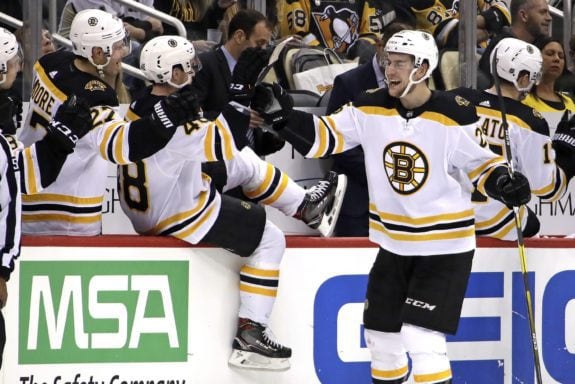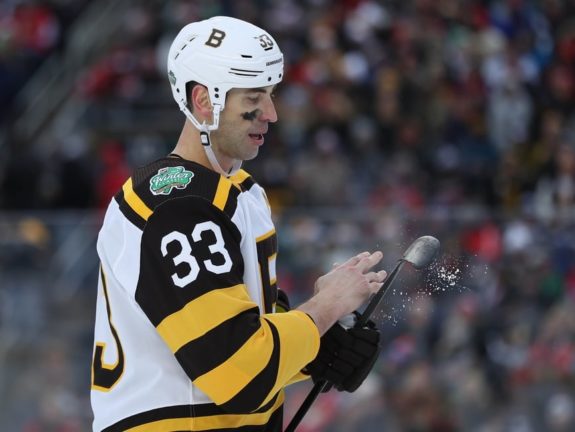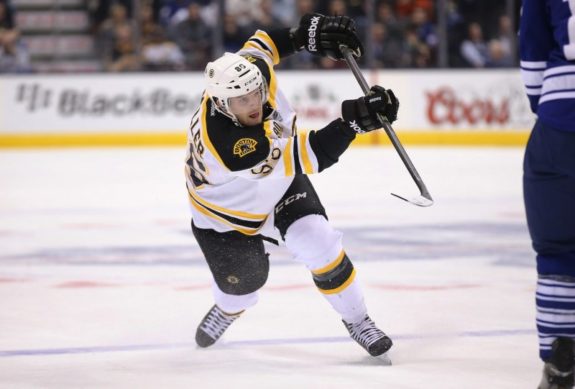The precedent for success generated by the Boston Bruins last season was exceeded in 2018-19. Thanks to the sensational play of their stalwarts and continued development of their young guns, the Bruins tied for second in the league in points. The achievement didn’t come without adversity.
From the backend out, the Black and Gold were ravaged by man-games lost to injury, including those to each regular member of their defensive corps. Up front, two-thirds of the team’s top line missed significant chunks of time, while only four Bruins suited up in more than 72 of their 82 games.

Still, the B’s were able to sustain their success. While it remains true that “there is no “I” in team,” we must consider what each player endured and how each performed as an individual. Here are letter grades for the 21 Bruins to have played in 30 regular season games this season.
Krejci Joins ‘Perfection Line’ as A-Listers
(A): Patrice Bergeron, Brad Marchand, David Pastrnak
Last season, the Bruins top line was christened as “The Perfection Line,” an overstatement for sure, but you can’t help but consider the trio close to it.
If not for a rib/sternoclavicular injury that cost him 16 games from Nov. 16 to Dec. 20, Bergeron likely would have factored into the Hart Trophy discussion as the league’s MVP. In his 65 games played, the NHL’s top two-way center had 79 points, including 32 goals, tying a career-high from 2015-16, set in 80 games played.
In Marchand, the Bruins featured their first 100-point scorer since Joe Thornton, back in 2002-03. It’s hard to believe that the left-winger scored only eight of his 36 goals through his first 30 games. He nearly doubled that output with seven goals in his next 10 games, setting his second-half tempo. Marchand also took a huge step forward as a leader this season, taming himself as to avoid the suspension cloud that has followed him throughout his nine-year career.
Rounding out the trio is Pastrnak, whose 81 points (in 66 games played) surpassed last season’s total by one, despite playing in 16 fewer games. The Bruins may very well have boasted a pair of century-mark scorers had the right-winger not required thumb surgery after a freak fall in February. Even still, Pastrnak proved the key cog to the power play, from where he scored 17 of his 38 goals, tied for fourth in the league. The first-time All-Star added 16 assists with the man advantage.
(A-): David Krejci
Perhaps the most refreshing storyline surrounding the Black and Gold was the resurgence of Krejci, who remains the team’s highest-paid player at $7.25 million per year. His ability to stay healthy alone warrants such a high grade. After missing 18 games a year ago, the second-line center played in 81 games, producing 73 points. This scoring output tied a career-high, set in his second full season in the league (2008-09), in 82 games played.
Carlo Highlights Balanced Backend on B-Team
(B+): Brandon Carlo, Jake DeBrusk, Jaroslav Halak, Chris Wagner
From a career development perspective, no Bruins player had more riding on 2018-19 than Carlo. After a shaky second season, the 22-year-old cemented his role in the top four with an impressive plus-22 rating. After scoring six goals as a rookie, Carlo had only two over the past two seasons. While an offensive element seems unlikely at this point, he has proven to be a steady, reliable defender.

Scoring 27 goals in your second season is no small feat, but for DeBrusk, it felt like underachieving. True, he only played in 68 games (due to both a concussion and lower body ailment), but my missed preseason prediction of the 30-goal mark is what ultimately kept the 22-year-old off the A-List. DeBrusk’s transcendent speed and tenacity figure to be staples of the team for years to come.
Where would the Bruins be without Halak this season? The 33-year-old netminder’s stellar work earned a near split in playing time with starter Tuukka Rask, who he drastically outplayed early on. Among goaltenders to play in at least 40 games, Halak finished tied for fourth in shutouts (5), fifth in goals-against average (2.34) and seventh in save percentage (.922).
In the case of Wagner, the Bruins’ NESN 7th Player Award recipient, I will defer to my previous piece on the Walpole, MA native’s homecoming.
(B): Zdeno Chara, Matt Grzelcyk, Torey Krug, Sean Kuraly, Charlie McAvoy, John Moore
While Carlo played his way to a slightly better grade (because he had to), the rest of the regular defensive core epitomized the term ‘solidarity’. McAvoy (28), Moore (21), Chara (20), Krug (18), and Grzelcyk (16) each missed over a quarter of the season, but each pulled their weight when healthy.
McAvoy would regress in most offensive categories but looked the part of a No. 1 defenseman. Moore brought a calming influence to the blueline, while Chara earned a one-year, $2 million contract extension. The captain finished an impressive plus-22, tying Carlo for second on the team. Krug alone finished with a minus rating (minus-2) while his 47 assists and 30 power-play points were career highs. Nine of Grzelcyk’s 18 points came with the man advantage, a promising sign.

The feeling of foreboding after losing Kuraly late in the season really spoke volumes to what the second-year speedster means to the Bruins. He, along with Wagner, solidified their fourth line as one of the best in hockey. It remains to be seen if Kuraly is capable and ready for third-line duty.
(B-): Noel Acciari, Steven Kampfer, Kevan Miller, Tuukka Rask
Sticking with the fourth line, Acciari again thrived in what seems to be his forged role, that of the 12th or 13th forward. The injury bug hitting others actually benefited the 27-year-old, as it allowed him to play 72 games. His eight assists and 14 points were career highs.
Similarly, Kampfer signed on as a depth defenseman and, despite finishing a team worst minus-six in 35 games, his presence didn’t hurt his team. As for Miller, this grade may seem harsh given his play while healthy, but hear me out. The trade of Adam McQuaid this past September provided Miller the opportunity to assume the role of a third-pairing tough guy, something I believed he’d thrive at. Unfortunately, he followed in the footsteps of the oft-injured McQuaid, playing in only 39 games.

And then there is Rask, among the most polarizing players in the league. His start to the season was an utter failure, leading to a short leave of absence. Down the stretch, things weren’t much better, but in between? How about a 16-1-3 mark from Dec. 29 – Mar. 9, a stretch that included a historic 19-game point streak. Such inconsistencies from a veteran goaltender, often referred to as ‘elite’, helped influence my decision. Selfishly, perhaps, I’ll always want more from Rask.
Backes, Heinen, Nordstrom Negate Bid at Honor Roll
(C+): David Backes, Danton Heinen, Joakim Nordstrom
I’ll give credit where it’s due and, for Backes, it comes from his acceptance of a new role, that of an enforcer. Let’s be honest, nothing else was working for the 35-year-old who finished with 20 points (seven goals) in 70 games. That’s simply not enough from a guy being paid $6 million per year.
While DeBrusk avoided dreaded sophomore slump, the same can’t be said for Heinen, who drastically regressed in his second season. To his credit, Heinen filled in admirably on the top line in the absence of Pastrnak, with a goal and 12 assists in 16 games, to salvage his season.
Last and, in my humble opinion, certainly least is Nordstrom, who I could never really figure out. Assuming the preseason plan was really for him to compete for a spot on the third line, then this grade might be too high. Still, you could do worse for forward depth. Remember Zac Rinaldo?